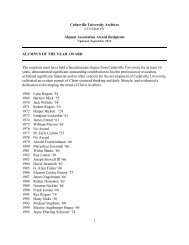Education Current Catalog - Cedarville University
Education Current Catalog - Cedarville University
Education Current Catalog - Cedarville University
Create successful ePaper yourself
Turn your PDF publications into a flip-book with our unique Google optimized e-Paper software.
Department of<br />
<strong>Education</strong><br />
Mission Statement (Page 68)<br />
Department Distinctives (Page 68)<br />
Personal Requirements (Page 68)<br />
Cocurricular Opportunities (Page 68)<br />
Teacher <strong>Education</strong> Program Admission Requirements (Page 68)<br />
Programs of Study (Page 69)<br />
Career Opportunities (Page 69)<br />
Faculty (Page 69)<br />
Praxis II Pass Rate Data: Regular Teacher Preparation Program (Page 70)<br />
Aggregate Assessment Pass Rate (Page 70)<br />
Contextual Information for the 2009–10 Academic Year (Page 70)<br />
General <strong>Education</strong> Requirements for <strong>Education</strong> Majors (Page 71)<br />
Teacher <strong>Education</strong> Core (Page 71)<br />
Majors<br />
»»<br />
Early Childhood <strong>Education</strong> (Page 71)<br />
»»<br />
Early Childhood <strong>Education</strong> Generalist Endorsement (Grades 4–5) (Page 72)<br />
»»<br />
Middle Childhood <strong>Education</strong> (Page 72)<br />
»»<br />
Special <strong>Education</strong> — Intervention Specialist (Page 74)<br />
»»<br />
Adolescent/Young Adult and Multi-Age Licensure Programs (Page 76)
Introduction Admissions Academic Information Academic Departments Course Descriptions Financial Information Appendix Index<br />
Department of <strong>Education</strong> | College of Professions<br />
Mission Statement<br />
The <strong>Cedarville</strong> <strong>University</strong> Department of <strong>Education</strong> seeks<br />
to prepare compassionate, professional educators who are<br />
committed to the integration of faith, learning, and life as<br />
demonstrated in teaching competence and Christlike character<br />
through leadership and service.<br />
Department Distinctives<br />
• Accreditation: <strong>Cedarville</strong> <strong>University</strong> is accredited by the<br />
North Central Association of Colleges and Schools and<br />
National Council for the Accreditation of Teacher <strong>Education</strong><br />
Council. The <strong>University</strong>’s teacher preparation programs are<br />
approved by the Ohio Department of <strong>Education</strong>.<br />
• Each year approximately 10 percent of the senior education<br />
students pursue cross-cultural student teaching experiences.<br />
They teach under the supervision of experienced, certified<br />
teachers in approved, accredited, overseas institutions that<br />
use an American curriculum.<br />
• The <strong>University</strong>’s award-winning technology resources enable<br />
upper-level students to develop lessons and curriculum<br />
resource materials for K–12 partner technology schools.<br />
Because of training in the use of educational technology,<br />
graduates are sought by schools to help integrate technology<br />
into their curricula.<br />
• Intensive clinical experiences accompany methods classes.<br />
As a result, many schools comment that <strong>Cedarville</strong> graduates<br />
possess experience and confidence uncommon in most firstyear<br />
teachers.<br />
• <strong>Cedarville</strong>’s reputation for producing exceptional teachers<br />
generates significant demand from school systems. Each<br />
year Christian and public schools visit the campus to recruit<br />
teacher education graduates.<br />
Licensure – Public Schools<br />
The education licensure programs listed in the catalog are<br />
subject to revision at any time given changes in national and<br />
state requirements for the Teacher <strong>Education</strong> programs in<br />
Ohio, which may also result in adjustment to your graduation<br />
requirements.<br />
All programs leading to licensure at <strong>Cedarville</strong> <strong>University</strong> are<br />
approved by the Ohio Department of <strong>Education</strong>. Ohio bases<br />
its requirements and approval processes on standards set by<br />
the National Council for Accreditation of Teacher <strong>Education</strong><br />
(NCATE). <strong>Cedarville</strong> is a member of NCATE and thus programs<br />
are approved directly by NCATE. Ohio is a participant in the<br />
Interstate Agreement on Qualifications of <strong>Education</strong>al Personnel<br />
and has an implementation agreement (reciprocity) with 42 states.<br />
This agreement provides for recognition of Ohio Department of<br />
<strong>Education</strong>-approved programs by member states.<br />
Although reciprocal licensure contracts exist with 42 states, in<br />
many cases, students must meet additional requirements to obtain<br />
extended or permanent licensure for those states. Also, because<br />
of the nature of Ohio’s teacher licensing standards, graduates with<br />
an Ohio license will normally be granted a license of “best fit” with<br />
the state in which the graduate wishes to teach. State licensure<br />
requirements are changing in many states; therefore, students<br />
who wish to teach outside of Ohio should obtain a current<br />
description of certification requirements from the department of<br />
education for each state in which they would like to teach. Most<br />
states have their certification requirements posted electronically.<br />
Individuals completing the program receive certification from the<br />
Association of Christian Schools International (ACSI). Christian<br />
schools around the world recognize this certification.<br />
Demographic Profile<br />
The number of Teacher <strong>Education</strong> Program completers for the<br />
2010–11 reporting period was 80. The demographic profile of<br />
program completers for the 2010–11 reporting period is:<br />
Number Percent<br />
White 77 96.2<br />
African American 1 1.1<br />
Hispanic 0 0<br />
Asian 2 2.2<br />
Other 0 0.0<br />
Male 15 18.75<br />
Female 65 81.25<br />
Personal Requirements<br />
Students interested in the Teacher <strong>Education</strong> Program should<br />
enjoy the teaching and learning process and enjoy working with<br />
people. The best teachers are those who are lifelong learners<br />
and enjoy serving others; they are people who are motivated<br />
more by making a difference in others’ lives than in making a lot<br />
of money. <strong>Cedarville</strong> <strong>University</strong> desires to work with students who<br />
are becoming professionals in their treatment of others, in their<br />
dress and demeanor, and in punctuality and responsibility for<br />
tasks. Because of the increasingly stringent standards for teachers<br />
nationwide, teacher candidates must be able to demonstrate their<br />
preparedness to teach by achieving good grades and passing<br />
state-mandated tests for teachers.<br />
Cocurricular Opportunities<br />
Numerous opportunities exist for tutoring in public schools,<br />
mentoring K–12 students, and becoming involved in local church<br />
ministries to children and adolescents. In addition students may<br />
choose to join Chi Delta Epsilon, a student organization for<br />
Christian educators.<br />
Teacher <strong>Education</strong> Program<br />
Admission Requirements<br />
Students admitted to <strong>Cedarville</strong> <strong>University</strong> must also make<br />
application for formal admission to the Teacher <strong>Education</strong> Program<br />
(TEP) usually early in the junior year. To be admitted, students<br />
must meet the following requirements at least one semester<br />
before enrolling in the first methods of teaching course for their<br />
particular program. These requirements apply to all students<br />
seeking a degree and/or license in either early childhood<br />
education, middle childhood education, special education,<br />
multi-age education, or adolescent/young adult education (i.e.,<br />
secondary education). Students seeking a degree/licensure<br />
in a program offered by another department should review the<br />
requirements of that department as well.<br />
1. Minimum cumulative GPA of 2.7 in all courses and 2.7 GPA<br />
in all TEP core curriculum courses. All TEP core courses<br />
must be completed with a grade of “C-” or higher.<br />
2. Combined GPA of 2.65 and a grade of “C-” or higher in<br />
both general education communications courses: COM-<br />
1100 Fundamentals of Speech and ENG-1400 English<br />
Composition.<br />
3. Minimum GPA of 2.5 in the teaching field content area(s),<br />
and content core for early childhood education.<br />
4. No grade of less than “C-” in teaching field or concentration<br />
area courses. For early childhood, middle childhood, and<br />
special education, this includes general education courses<br />
in the content areas of humanities, science, mathematics,<br />
and social science.<br />
5. Minimum passing scores on the Praxis I (Pre-Professional<br />
Skills Test): Reading, 175; Writing, 174; Mathematics, 175.<br />
Page 68 2012–13 Undergraduate <strong>Catalog</strong>
Introduction Admissions Academic Information Academic Departments Course Descriptions Financial Information Appendix Index<br />
Department of <strong>Education</strong> | College of Professions<br />
6. Satisfactory completion of all introductory field experiences:<br />
EDUC-1050 Preliminary Student Involvement, EDUC-<br />
2200 Multicultural Field Experience, and EDSP-2050 Field<br />
Experience: Exceptional Learning Needs.<br />
7. Valid “No Record” background check for the state of Ohio<br />
and an additional FBI background check.<br />
Teacher <strong>Education</strong> Program Retention and Completion<br />
Requirements<br />
To maintain regular standing in the Teacher <strong>Education</strong> Program<br />
and/or to receive a degree, students must maintain and/or<br />
complete the following requirements:<br />
Maintain a GPA of 2.7 or higher in all courses.<br />
1. Obtain a “C-” or higher in all methods courses.<br />
2. Satisfactorily complete field and clinical experiences.<br />
3. Earn a passing score on state-required Praxis II exams.<br />
4. Satisfactorily complete the internship experience.<br />
Programs of Study<br />
The department of education offers instruction with the purpose<br />
of providing excellent Christian teachers for Christian, public,<br />
international, and missionary schools. The <strong>University</strong> is approved<br />
by the Ohio Department of <strong>Education</strong> for programs leading to a<br />
teaching license or endorsement in several areas.<br />
• Multi-Age Special <strong>Education</strong> — Intervention Specialist (K–12)<br />
• Early Childhood <strong>Education</strong> (pre–K to grade 3)<br />
• Middle Childhood <strong>Education</strong> (grades 4–9)<br />
Two concentrations chosen from:<br />
• Mathematics<br />
• Reading/Language Arts<br />
• Science<br />
• Social Studies<br />
See appropriate department for a complete description of the<br />
following programs:<br />
• Adolescent and Young Adult (grades 7–12)<br />
• Language Arts <strong>Education</strong> – Integrated<br />
(department of English, literature, and modern<br />
languages, page 91)<br />
• Life Science <strong>Education</strong><br />
• Mathematics <strong>Education</strong> – Integrated<br />
• Physical Science <strong>Education</strong><br />
• Physics <strong>Education</strong><br />
• Science Comprehensive <strong>Education</strong> – Integrated<br />
(department of science and mathematics, page 187)<br />
• Social Studies <strong>Education</strong> – Integrated<br />
(department of history and government, page 107)<br />
• Multi-Age Licensure (pre–K to grade 12)<br />
• Health <strong>Education</strong><br />
• Physical <strong>Education</strong><br />
(department of kinesiology and allied health, page 125)<br />
• Music <strong>Education</strong><br />
(department of music and worship, page 148)<br />
• Spanish <strong>Education</strong><br />
(department of English, literature, and modern<br />
languages, page 93)<br />
Endorsements<br />
Students interested in an endorsement must possess or<br />
be working toward the completion of a degree and licensure<br />
requirements in any of the current teaching licensure areas.<br />
The early childhood education generalist endorsement<br />
prepare teachers to work with students in grades 4 and 5.<br />
Early Childhood <strong>Education</strong> Generalist<br />
Endorsement courses..................................................................9<br />
EDMC-2800 Development Issues in Young Adolescents........... 2<br />
EDMC-3550 Curriculum and Instruction for Grades 4 and 5..... 3<br />
EDMC-3970 Middle Childhood Clinical (grades 4 and 5).......... 2<br />
HIST-2100 Ohio History for Educators....................................... 2<br />
Early childhood or special education majors who wish to qualify<br />
for prekindergarten special education endorsement may do so by<br />
adding the following courses to their early childhood licensure:<br />
ECSP-2500 Young Children with Special Needs............................3<br />
ECSP-3500 Assessing and Teaching Young Children....................3<br />
ECSP-3550 Clinical: Young Children with Special Needs...............3<br />
TESOL (Teaching English to Speakers of Other Languages)<br />
Course requirements:<br />
COM-2140 Intercultural Communication.........................................3<br />
ENG-3060 History of the English Language..................................3<br />
ENG-3070 Advanced Grammar for Adolescent Teachers...............3<br />
LING-3080 Linguistics for Language Learning...............................3<br />
LING-3090 Sociolinguistics............................................................3<br />
LING-3600 Clinical Experience......................................................1<br />
LING-3610 Practicum.....................................................................2<br />
LING-3500 Methods of Teaching Foreign Language......................2<br />
Praxis II TESOL exam<br />
Career Opportunities<br />
Christian and public schools actively recruit <strong>Cedarville</strong><br />
education graduates. Graduate schools also welcome <strong>Cedarville</strong><br />
students. Careers pursued by department of education graduates<br />
include:<br />
• Christian school teacher<br />
• Church education programs<br />
• Elementary school teacher<br />
• High school or middle school teacher<br />
• International school teacher<br />
• Library science<br />
• Mission school teacher<br />
• Music teacher K–12<br />
• Physical education/health education teacher K–12<br />
• Preschool director or teacher<br />
• Special education (mild–moderate educational needs)<br />
• Youth camps<br />
Faculty<br />
Stephen Gruber, Chair. Associate Professor of <strong>Education</strong>.<br />
<strong>Education</strong>: B.A., <strong>Cedarville</strong> <strong>University</strong>, 1974; M.Ed., Wright State<br />
<strong>University</strong>, 1977; Ed.S., Wright State <strong>University</strong>, 1984; Ed.D., Miami<br />
<strong>University</strong>, 1990. At <strong>Cedarville</strong> since 2000.<br />
Merlin Ager, Professor of <strong>Education</strong>. <strong>Education</strong>: B.A., <strong>Cedarville</strong><br />
<strong>University</strong>, 1960; M.S., <strong>University</strong> of Wisconsin, 1962; Ph.D., The<br />
Ohio State <strong>University</strong>, 1967. At <strong>Cedarville</strong> 1964–75 and since 1978.<br />
Eddie Baumann, Professor of <strong>Education</strong>. <strong>Education</strong>: B.S.,<br />
<strong>University</strong> of Wisconsin, 1983; M.S., <strong>University</strong> of Wisconsin, 1987;<br />
Ph.D., <strong>University</strong> of Wisconsin, 1995. At <strong>Cedarville</strong> since 1993.<br />
Page 69 2012–13 Undergraduate <strong>Catalog</strong>
Introduction Admissions Academic Information Academic Departments Course Descriptions Financial Information Appendix Index<br />
Department of <strong>Education</strong> | College of Professions<br />
Terry Comers, Assistant Professor of <strong>Education</strong>. <strong>Education</strong>: B.A.,<br />
<strong>Cedarville</strong> <strong>University</strong>, 1977; M.Ed., Wright State <strong>University</strong>, 1995.<br />
At <strong>Cedarville</strong> since 2004.<br />
Lori Ferguson, Instructor of <strong>Education</strong>. <strong>Education</strong>: B.A.,<br />
<strong>Cedarville</strong> <strong>University</strong>, 1998; M.S., <strong>University</strong> of Dayton, 2002.<br />
Margaret Grigorenko, Assistant Professor of <strong>Education</strong>.<br />
<strong>Education</strong>: B.S., Bowling Green State <strong>University</strong>, 1978; M.Ed.,<br />
<strong>Cedarville</strong> <strong>University</strong>, 1995; Ph.D., The Ohio State <strong>University</strong>, 2010.<br />
At <strong>Cedarville</strong> since 2006.<br />
Timothy Heaton, Professor of <strong>Education</strong>. <strong>Education</strong>: B.A.,<br />
Wittenberg <strong>University</strong>, 1973; M.A., Grace Theological Seminary,<br />
1986; Ph.D., <strong>University</strong> of Dayton, 1999. At <strong>Cedarville</strong> since 1987.<br />
Jon Hess, Director of Student Teaching and Licensure and<br />
Assistant Professor of <strong>Education</strong>. <strong>Education</strong>: B.S., <strong>Cedarville</strong><br />
<strong>University</strong>, 1967; M.Ed.Ad., <strong>University</strong> of Dayton, 1980;<br />
Postgraduate work, Wright State <strong>University</strong> and <strong>University</strong> of<br />
Dayton, 1990. At <strong>Cedarville</strong> since 2000.<br />
Ruth Hess, Assistant Professor of <strong>Education</strong>. <strong>Education</strong>: B.A.,<br />
<strong>Cedarville</strong> <strong>University</strong>, 1967; M.Ed., <strong>Cedarville</strong> <strong>University</strong>, 2009. At<br />
<strong>Cedarville</strong> since 2008.<br />
David Leitch, Assistant Professor of <strong>Education</strong>. <strong>Education</strong>:<br />
B.S. Baptist Bible College of Pennsylvania, 1984; M.S., Central<br />
Michigan <strong>University</strong>, 1990; J.D., Cleveland State <strong>University</strong>, 1993;<br />
M.Ed., Cleveland State <strong>University</strong>, 2008. At <strong>Cedarville</strong> since 2012.<br />
Kyle Mack, Assistant Professor of <strong>Education</strong>. <strong>Education</strong>: B.S.,<br />
Wright State <strong>University</strong>, 2005; M.Ed., Wright State <strong>University</strong>, 2007.<br />
At <strong>Cedarville</strong> since 2012.<br />
Brenda MacKay, Associate Professor of <strong>Education</strong>. <strong>Education</strong>:<br />
B.A., Oglethorpe <strong>University</strong>, 1965; M.A., <strong>University</strong> of Georgia,<br />
1972; Ed.D., Bob Jones Univerisity, 1992. At <strong>Cedarville</strong> since<br />
2000.<br />
Lynn Roper, Assistant Professor of Special <strong>Education</strong>. <strong>Education</strong>:<br />
B.S., Asbury College, 1988; Certification in Special <strong>Education</strong>,<br />
<strong>University</strong> of Kentucky, 1990; M.S.W., <strong>University</strong> of Kentucky,<br />
2000; Graduate study in special education, <strong>University</strong> of Kentucky,<br />
2005–present. At <strong>Cedarville</strong> since 2010.<br />
Thomas Sweigard, Associate Professor of <strong>Education</strong>. <strong>Education</strong>:<br />
B.S., Bowling Green State <strong>University</strong>, 1973; M.A., The Ohio<br />
State <strong>University</strong>, 1982; Ph.D., The Ohio State <strong>University</strong>, 1992. At<br />
<strong>Cedarville</strong> since 2003.<br />
Emeriti<br />
Sue Baker, Professor Emerita of <strong>Education</strong>. <strong>Education</strong>: B.S., Kent<br />
State <strong>University</strong>, 1968; M.Ed., Kent State <strong>University</strong>, 1972; Ed.D.,<br />
<strong>University</strong> of Cincinnati, 1987. At <strong>Cedarville</strong> since 1978.<br />
Omer Bonenberger, Associate Professor Emeritus of <strong>Education</strong>.<br />
<strong>Education</strong>: B.A., Bob Jones <strong>University</strong>, 1960; M.A., Arizona State<br />
<strong>University</strong>, 1968; D.Ed., <strong>University</strong> of Maine, 1981. At <strong>Cedarville</strong><br />
since 1981.<br />
Sally Castle, Professor Emerita of <strong>Education</strong>. <strong>Education</strong>: B.S.,<br />
Syracuse <strong>University</strong>, 1964; M.S., The <strong>University</strong> of Dayton, 1983;<br />
Ed.S., Wright State <strong>University</strong>, 1992; Ed.D., Nova Southeastern<br />
<strong>University</strong>, 1996. At <strong>Cedarville</strong> since 1994.<br />
Dwayne Frank, Professor Emeritus of <strong>Education</strong>. <strong>Education</strong>: B.A.,<br />
<strong>Cedarville</strong> <strong>University</strong>, 1960; B.S., Central State <strong>University</strong>, 1960;<br />
M.A.T., Albertson College, 1965; Ed.D., <strong>University</strong> of Idaho, 1973.<br />
At <strong>Cedarville</strong> since 1968. PT/Adjunct since 2003.<br />
Praxis II Pass Rate Data: Regular Teacher Preparation Program<br />
Academic Year: 2009–10 Testing Period: 7/09–6/10 Number of Program Completers: 75<br />
Type of Assessment<br />
# Taking<br />
Praxis II<br />
Ave. Pass Rate<br />
(%)<br />
OH Pass<br />
Score<br />
OH Pass<br />
Rate (%) 1<br />
Professional Knowledge<br />
Principles of Learning and Teaching: Early Child 35 100 166 99%<br />
Principles of Learning and Teaching: 5–9 17 100 168 95%<br />
Principles of Learning and Teaching: 7–12 38 100 165 98%<br />
*No pass rate information is reported when fewer than 10 teacher candidates take a particular Praxis II test. Results are reported in Aggregate Assessment Pass Rate below.<br />
t<br />
The state passing rate is based on data collected from all Ohio students taking the Praxis II in 2007–08, regardless of their status in a Teacher <strong>Education</strong> Program.<br />
Aggregate Assessment Pass Rate<br />
Statewide<br />
Group<br />
# Taking<br />
Assessment 3<br />
# Passing<br />
Assessment 4<br />
Institutional<br />
Pass Rate<br />
# Taking<br />
Assessment 1<br />
# Passing<br />
Assessment 2<br />
Statewide<br />
Pass Rate<br />
All program completers, 2010–11 73 70 96% 5803 5576 96%<br />
All program completers, 2009–10 90 90 100% 5803 5576 96%<br />
All program completers, 2008–09 56 56 100% 6389 6257 98%<br />
2<br />
The national passing rate is calculated at Ohio’s cut scores, which are among the highest in the nation.<br />
3<br />
Number of completers taking one or more assessments within their area of specialization.<br />
4<br />
Number who passed all assessments taken within their area of specialization.<br />
Contextual Information for the 2009–10 Academic Year<br />
Total number of students officially enrolled in teacher preparation, all specializations, in academic year 2009–10 152<br />
Number of students in supervised student teaching in academic year 2009–10 75<br />
Number of faculty members who supervised student teachers in 2009–10 7<br />
The average number of student teaching hours per week required 35–40<br />
The total number of weeks of supervised student teaching required 12<br />
Average total number of hours required 360<br />
Page 70 2012–13 Undergraduate <strong>Catalog</strong>
Introduction Admissions Academic Information Academic Departments Course Descriptions Financial Information Appendix Index<br />
Department of <strong>Education</strong> | College of Professions<br />
General <strong>Education</strong> Requirements<br />
for <strong>Education</strong> Majors<br />
Early Childhood <strong>Education</strong> (EC)<br />
Middle Childhood <strong>Education</strong> (MC)<br />
Special <strong>Education</strong> — Intervention Specialist (SpE)<br />
Biblical and Theological Studies...............................................16<br />
BEGE-1710 Christian Life and Thought..................................... 3<br />
BEGE-1720 Spiritual Formation................................................ 3<br />
BEGE-2730 Old Testament Literature....................................... 3<br />
BEGE-2740 New Testament Literature...................................... 3<br />
BEGE-3750 Christian Worldview Development......................... 2<br />
BEGE-3760 Christian Worldview Integration............................. 2<br />
Communications..........................................................................6<br />
COM-1100 Fundamentals of Speech......................................... 3<br />
ENG-1400 English Composition................................................ 3<br />
Humanities .............................................................................9–12<br />
EDUC-2400 Children’s Literature (EC, SpE)............................. 3<br />
EDUC-3100 Philosophical Foundations of <strong>Education</strong>............... 3<br />
*HUM-1400 Introduction to the Humanities............................... 3<br />
*LIT-2300 Introduction to Literature............................................ 3<br />
(or LIT-2340 Western Literature............................................. 3)<br />
Physical <strong>Education</strong>.......................................................................2<br />
PEF-1990 Physical Activity and the Christian Life..................... 2<br />
Science and Mathematics....................................................13–17<br />
*GBIO-1000 Principles of Biology........................................... 3.5<br />
EDUC-1800 Principles of Mathematics I................................... 3<br />
EDUC-2800 Principles of Mathematics II.................................. 3<br />
*GSCI-1010 Principles of Earth Science (EC) ....................... 3.5<br />
*GSCI-2010 Physical Science for Teachers (EC, SpE) ............. 4<br />
1<br />
Physical Science elective selected from:........................ 3.5–4.0<br />
ESCI-2310 Introduction to Oceanography..........................4<br />
ESCI-2410 General Meteorology........................................4<br />
ESCI-2510 Introduction to Astronomy.................................4<br />
GSCI-1010 Principles of Earth Science............................3.5<br />
GSCI-2010 Physical Science for Teachers..........................4<br />
Social Science..............................................................................9<br />
*GSS-1100 Politics and American Culture................................. 3<br />
2<br />
HIST-1110 United States History I............................................. 3<br />
(or HIST-1120 United States History II................................... 3)<br />
*Global Studies elective selected from.................................. 3<br />
ANTH-1800 Cultural Anthropology......................................3<br />
GEO-3520 World Regional Geography – Eastern (SpE)....3<br />
HIST-3220 History and Politics of the Middle East..............3<br />
Foreign Language....................................................................0–8<br />
See the global awareness section of the general education<br />
requirements.<br />
*Content core courses for early childhood and special education<br />
1<br />
Students pursuing science concentration for middle childhood must take GSCI-1010<br />
EDUC-1050 Preliminary Student Involvement........................... 0<br />
EDUC-2000 Introduction to Diverse Learners........................... 2<br />
EDUC-2100 Technology in the Classroom................................ 2<br />
EDUC-2200 Multicultural Field Experience............................... 1<br />
EDUC-2500 <strong>Education</strong>al Psychology........................................ 3<br />
EDSP-2000 Teaching Children with Exceptionalities................. 1<br />
EDSP-2050 Field Experience: Exceptional Learning Needs..... 1<br />
Early Childhood <strong>Education</strong><br />
The early childhood education major prepares students to<br />
teach preschool and early elementary school (pre-K to grade 3) in<br />
public and Christian schools.<br />
Principles of Earth Science.<br />
2<br />
Students pursuing social studies concentration for middle childhood must take HIST-<br />
1110 United States History I.<br />
Teacher <strong>Education</strong> Core<br />
Required of all Teacher <strong>Education</strong> majors<br />
Teacher <strong>Education</strong> Core............................................................12<br />
EDUC-1000 The <strong>Education</strong> Profession...................................... 2<br />
Page 71 2012–13 Undergraduate <strong>Catalog</strong>
Introduction Admissions Academic Information Academic Departments Course Descriptions Financial Information Appendix Index<br />
Department of <strong>Education</strong> | College of Professions<br />
Course requirements involve 67 semester hours including:<br />
Teacher <strong>Education</strong> Core (see page 71) ....................................12<br />
Early Childhood Foundations.................................................... 11<br />
EDEC-2100 Art and Music for Early Childhood......................... 2<br />
EDEC-2300 Phonics and the Reading Process........................ 4<br />
EDSP-2500 Survey of Intellectual and<br />
Developmental Disabilities..................................................... 1<br />
ESED-2900 Health and Movement <strong>Education</strong>.......................... 2<br />
PYCH-2725 Child Development................................................. 2<br />
Early Childhood Methods I........................................................17<br />
EDEC-3500 Early Childhood <strong>Education</strong>.................................... 3<br />
EDEC-3600 Issues in Early Childhood Administration.............. 3<br />
EDEC-3800 Teaching Reading and Lang. Arts: EC................... 4<br />
EDEC-3900 Field Experience in Early Childhood <strong>Education</strong>.... 1<br />
EDEC-3950 Early Childhood Clinical I...................................... 3<br />
EDSP-3100 Diagnostics and Intervention in Reading............... 3<br />
Early Childhood Methods II.......................................................17<br />
EDEC-4000 Reading in the Content Area: EC........................... 2<br />
EDEC-4100 Teaching Mathematics: EC.................................... 3<br />
EDEC-4200 Teaching Science: EC............................................ 3<br />
EDEC-4300 Teaching Social Studies: EC.................................. 3<br />
EDEC-4450 Early Childhood Clinical II..................................... 3<br />
EDSP-4250 Communication, Collaboration, and Inclusion........ 2<br />
EDUC-3200 Faith and Learning Alignment............................... 1<br />
Student Teaching..................................................................10–12<br />
*EDEC-4900 Student Teaching and Seminar: EC.................. 10–12<br />
*Capstone Course<br />
Early Childhood <strong>Education</strong> Major Curriculum Summary<br />
Proficiency Requirements...........................................................0–5<br />
General <strong>Education</strong> Requirements..........................................62–70<br />
Early Childhood <strong>Education</strong> Major Requirements..........................67<br />
Total (minimum, not including proficiency)................... 129–137<br />
Early Childhood <strong>Education</strong> Generalist<br />
Endorsement (Grades 4–5)<br />
The early childhood education generalist endorsement<br />
prepares teachers to work with students in grades 4 and 5.<br />
Early Childhood <strong>Education</strong> Generalist<br />
Endorsement courses..................................................................9<br />
EDMC-2800 Development Issues in Young Adolescents........... 2<br />
EDMC-3550 Curriculum and Instruction for Grades 4 and 5..... 3<br />
EDMC-3970 Middle Childhood Clinical (grades 4 and 5).......... 2<br />
HIST-2100 Ohio History for Educators....................................... 2<br />
A complete description of the general education requirements is found on page 26.<br />
Suggested Four-Year Curriculum for a<br />
Major in Early Childhood <strong>Education</strong><br />
First year:<br />
BEGE-1710 Christian Life and Thought..............................................3<br />
BEGE-1720 Spiritual Formation.........................................................3<br />
COM-1100 Fundamentals of Speech..................................................3<br />
EDUC-1000 The <strong>Education</strong> Profession...............................................2<br />
EDUC-1050 Preliminary Student Involvement....................................0<br />
ENG-1400 Composition......................................................................3<br />
GBIO-1000 Principles of Biology.....................................................3.5<br />
GEO-3520 World Regional Geography – Eastern..............................3<br />
GSCI-1010 Principles of Earth Science...........................................3.5<br />
GSS-1100 Politics and American Culture...........................................3<br />
PEF-1990 Physical Activity and the Christian Life..............................2<br />
PYCH-2725 Child Development..........................................................2<br />
Literature Elective...............................................................................3<br />
Total................................................................................................. 34<br />
Second year:<br />
BEGE-2730 Old Testament Literature................................................3<br />
BEGE-2740 New Testament Literature...............................................3<br />
BEGE-3750 Christian Worldview Development..................................2<br />
EDEC-2100 Art and Music for Early Childhood..................................2<br />
EDSP-2000 Teaching Children with Exceptionalities..........................1<br />
EDSP-2050 Field Experience: Exceptional Learning Needs..............1<br />
EDSP-2500 Survey of Intellectual and Developmental Disabilities....1<br />
EDUC-1800 Principles of Mathematics I............................................3<br />
EDUC-2000 Introduction to Diverse Learners....................................2<br />
EDUC-2100 Technology in the Classroom.........................................2<br />
EDUC-2200 Multicultural Field Experience........................................1<br />
EDUC-2400 Children’s Literature........................................................3<br />
ESED-2900 Health and Movement <strong>Education</strong>...................................2<br />
GSCI-2010 Physical Science for Teachers..........................................4<br />
HIST-3750 Social Movements............................................................3<br />
Total................................................................................................. 33<br />
Third year:<br />
BEGE-3760 Christian Worldview Integration......................................2<br />
EDEC-2300 Phonics and the Reading Process.................................4<br />
EDEC-3500 Early Childhood <strong>Education</strong>.............................................3<br />
EDEC-3600 Issues in Early Childhood Administration.......................3<br />
EDEC-3800 Teaching Reading and Language Arts: EC.....................4<br />
EDEC-3900 Field Experience in Early Childhood <strong>Education</strong>.............1<br />
EDEC-3950 Early Childhood Clinical I...............................................3<br />
EDSP-3100 Diagnostics and Intervention in Reading........................3<br />
EDUC-2500 <strong>Education</strong>al Psychology.................................................3<br />
EDUC-2800 Principles of Mathematics II...........................................3<br />
EDUC-3100 Philosophical Foundations of <strong>Education</strong>........................3<br />
HUM-1400 Introduction to the Humanities..........................................3<br />
Total................................................................................................. 35<br />
Fourth year:<br />
EDEC-4000 Reading in the Content Area: EC....................................2<br />
EDEC-4100 Teaching Mathematics: EC.............................................3<br />
EDEC-4200 Teaching Science: EC....................................................3<br />
EDEC-4300 Teaching Social Studies: EC..........................................3<br />
EDEC-4450 Early Childhood Clinical II..............................................3<br />
EDEC-4900 Student Teaching and Seminar: EC............................. 10<br />
EDSP-4250 Communication, Collaboration, and Inclusion................2<br />
EDUC-3200 Faith and Learning Alignment........................................1<br />
Total................................................................................................. 27<br />
Middle Childhood <strong>Education</strong><br />
The middle childhood education major prepares students to<br />
teach upper elementary or middle school (grades fourth to ninth).<br />
Students will prepare to teach in two of the four major curriculum<br />
areas: reading and language arts, mathematics, science, or social<br />
studies.<br />
Course requirements involve 43–45 education semester hours<br />
Page 72 2012–13 Undergraduate <strong>Catalog</strong>
Introduction Admissions Academic Information Academic Departments Course Descriptions Financial Information Appendix Index<br />
Department of <strong>Education</strong> | College of Professions<br />
plus 36–41 concentration area hours including:<br />
Teacher <strong>Education</strong> Core (see page 71) ....................................12<br />
Middle School Methods I...........................................................13<br />
EDMC-3500 Principles of Teaching Middle School................... 4<br />
EDMC-3600 Phonics/Structure Language................................ 3<br />
EDMC-3700 Teaching Reading / Middle Childhood Literature.. 4<br />
EDMC-3950 Middle School Clinical I......................................... 2<br />
Middle School Methods II............................................................6<br />
EDMC-4000 Reading in Content Area: MC.... ........................... 3<br />
EDMC-4440 Middle School Clinical II........................................ 2<br />
EDUC-3200 Faith and Learning Alignment............................... 1<br />
Student Teaching..................................................................12–14<br />
*EDMC-4900 Student Teaching and Seminar....................10–12<br />
EDSP-4250 Communication, Collaboration, and Inclusion........ 2<br />
*Capstone Course<br />
Concentration Areas (must choose two)<br />
Mathematics................................................................................21<br />
EDMC-3300 Topics in Middle School Mathematics................... 3<br />
EDMC-4100 Teaching Mathematics: Middle Childhood............. 3<br />
GMTH-1020 College Algebra..................................................... 3<br />
GMTH-1030 Precalculus............................................................ 4<br />
GMTH-3010 Proof and Mathematical Modeling......................... 3<br />
MATH-1710 Calculus I............................................................... 5<br />
Language Arts............................................................................18<br />
COM-2320 Theories of Mass Media.......................................... 3<br />
EDMC-3800 Writing Process and Language<br />
Arts Methods for Middle School............................................. 3<br />
ENG-2230 Advanced Composition............................................ 3<br />
ENG-3060 The English Language............................................. 3<br />
ENG-3070 Advanced Grammar for Adolescent Teachers.......... 3<br />
LIT-2390 Survey of American Literature to 1900........................ 3<br />
Science........................................................................................20<br />
CHEM-1000 Principles of Chemistry......................................... 5<br />
EDMC-4200 Teaching Science: Middle Childhood.................... 3<br />
GSCI-2010 Physical Science for Teachers................................. 4<br />
GSCI-3010 Concepts in Middle School Science........................ 4<br />
GSCI-3060 Environmental Science for Middle School Educators.4<br />
Social Studies.............................................................................18<br />
ECON-2110 Essentials of Economics........................................ 3<br />
EDMC-4300 Teaching Social Studies: Middle Childhood.......... 3<br />
*GEO-3510 World Regional Geography — Western................. 3<br />
HIST-1120 United States History II............................................. 3<br />
HIST-2010 History of Civilization I.............................................. 3<br />
HIST-2020 History of Civilization II............................................ 3<br />
*Course also satisfies a general education requirement or a professional education<br />
requirement.<br />
EDUC-1800 Principles of Mathematics I............................................3<br />
ENG-1400 Composition......................................................................3<br />
GBIO-1000 Principles of Biology.....................................................3.5<br />
GSS-1100 Politics and American Culture...........................................3<br />
HUM-1400 Introduction to the Humanities..........................................3<br />
PEF-1990 Physical Activity and the Christian Life..............................2<br />
Concentration Electives......................................................................8<br />
Total.............................................................................................. 36.5<br />
Second year:<br />
BEGE-2730 Old Testament Literature................................................3<br />
BEGE-2740 New Testament Literature...............................................3<br />
EDSP-2000 Teaching Children with Exceptionalities..........................1<br />
EDSP-2050 Field Experience: Exceptional Learning Needs..............1<br />
EDUC-2000 Introduction to Diverse Learners....................................2<br />
EDUC-2100 Technology in the Classroom.........................................2<br />
EDUC-2200 Multi-cultural Field Experience.......................................1<br />
EDUC-2500 <strong>Education</strong>al Psychology.................................................3<br />
EDUC-2800 Principles of Mathematics II...........................................3<br />
ESCI/GSCI-1XXX Physical Science Elective..............................3.5–4<br />
Concentration Electives......................................................................8<br />
Global Studies Elective.......................................................................3<br />
Literature Elective...............................................................................3<br />
Total........................................................................................ 36.5–37<br />
Third year:<br />
BEGE-3750 Christian Worldview Development..................................2<br />
EDMC-3500 Principles of Teaching Middle School............................4<br />
EDMC-3600 Phonics and Structure of Language..............................3<br />
EDMC-3700 Teaching Reading Middle Childhood Literature.............4<br />
EDMC-3950 Middle School Clinical I.................................................2<br />
EDSP-4250 Communication, Collaboration, and Inclusion................2<br />
EDUC-3100 Philosophical Foundations of <strong>Education</strong>........................3<br />
HIST-XXXX History Elective...............................................................3<br />
Concentration Electives.................................................................... 12<br />
Total................................................................................................. 35<br />
Fourth year:<br />
BEGE-3760 Christian Worldview Integration......................................2<br />
EDMC-4000 Reading in the Content Area Middle Childhood.............3<br />
EDMC-4440 Middle School Clinical II................................................2<br />
EDMC-4900 Student Teaching and Seminar............................... 10-12<br />
EDUC-3200 Faith and Learning Alignment........................................1<br />
Concentration Electives................................................................ 8–13<br />
Total........................................................................................... 26–33<br />
Middle Childhood <strong>Education</strong> Major Curriculum Summary<br />
Proficiency Requirements...........................................................0–5<br />
General <strong>Education</strong> Requirements.......................................55–63.5<br />
Middle Childhood <strong>Education</strong> Major Requirements.......................43<br />
Concentration Requirements...................................................36-41<br />
Total (minimum, not including proficiency).................134–147.5<br />
*Total credits vary depending on concentrations chosen.<br />
A complete description of the general education requirements is found on page 26.<br />
Suggested Four-Year Curriculum for a<br />
Major in Middle Childhood <strong>Education</strong><br />
First year:<br />
BEGE-1710 Christian Life and Thought..............................................3<br />
BEGE-1720 Spiritual Formation.........................................................3<br />
COM-1100 Fundamentals of Speech..................................................3<br />
EDUC-1000 The <strong>Education</strong> Profession...............................................2<br />
EDUC-1050 Preliminary Student Involvement....................................0<br />
Page 73 2012–13 Undergraduate <strong>Catalog</strong>
Introduction Admissions Academic Information Academic Departments Course Descriptions Financial Information Appendix Index<br />
Department of <strong>Education</strong> | College of Professions<br />
Special <strong>Education</strong> — Intervention Specialist<br />
The special education — intervention specialist major<br />
prepares teachers to work with students in grades K to 12 who<br />
have mild to moderate special education needs.<br />
Course requirements involve 74-76 semester hours including:<br />
Teacher <strong>Education</strong> Core (see page 71) ....................................12<br />
Special <strong>Education</strong> Foundations ............................................... 11<br />
EDEC-2300 Phonics and the Reading Process........................ 4<br />
EDSP-2400 Language Development and<br />
Communication Disorders...................................................... 2<br />
EDSP-2500 Survey of Intellectual and<br />
Developmental Disabilities..................................................... 1<br />
EDSP-3500 Special <strong>Education</strong> Law.......................................... 1<br />
PYCH-2735 Child-Adolescent Development.............................. 3<br />
Special <strong>Education</strong> Block............................................................16<br />
EDSP-2700 Teaching Children Mild to Moderate Disabilities.... 2<br />
EDSP-4000 Principles of Inclusion............................................ 1<br />
EDSP-4100 Adaptive Curriculum and Instruction...................... 2<br />
EDSP-4150 Career and Occupational Training.......................... 2<br />
EDSP-4300 Behavior and Instructional Management............... 3<br />
EDSP-4400 Assessment in Special <strong>Education</strong>.......................... 3<br />
EDSP-4550 Special <strong>Education</strong> Clinical: AYA............................. 3<br />
Reading Methods........................................................................10<br />
EDEC-3800 Teaching Reading and Lang. Arts: EC................... 4<br />
EDSP-3150 Intervention and Diagnosis in Reading for<br />
Special Educators.................................................................. 3<br />
EDSP-3950 Special <strong>Education</strong> Clinical: EC............................... 3<br />
Early Childhood Methods II.......................................................15<br />
EDEC-4000 Reading in the Content Area................................. 2<br />
EDEC-4100 Teaching Mathematics: EC.................................... 3<br />
EDEC-4200 Teaching Science: EC............................................ 3<br />
EDEC-4300 Teaching Social Studies: EC.................................. 3<br />
EDSP-4450 Special Ed. Clinical: MC......................................... 3<br />
EDUC 3200 Faith and Learning Alignment................................ 1<br />
Student Teaching..................................................................10–12<br />
*EDSP-4900 Student Teaching and Seminar: SpE.............10–12<br />
*Capstone Course<br />
Pre-kindergarten special education endorsement<br />
Early childhood or special education majors who wish to qualify<br />
for pre-kindergarten special education endorsement may do so<br />
by adding the following courses to their early childhood licensure:<br />
ECSP-2500 Young Children with Special Needs............................3<br />
ECSP-3500 Assessing and Teaching Young Children....................3<br />
ECSP-3550 Clinical: Young Children with Special Needs...............3<br />
Reading endorsement<br />
Early childhood or special education majors who wish to qualify<br />
for reading endorsement may do so by adding the following<br />
courses to their education licensure:<br />
Early Childhood Eduction Majors:<br />
EDSP-2400 Language Development and<br />
Communication Disorders...........................................................2<br />
EDSP-3100 Diagnostic and Intervention in Reading......................3<br />
EDSP-3400 Advanced Study in the Teaching of<br />
Developmental Reading..............................................................2<br />
EDUC-3570 Supervised Field Experience in Reading...................2<br />
Reading Tutoring (1 hour within the following clinical)....................1<br />
EDEC-3950 Early Childhood Clinical I................................... 1<br />
Intervention Specialist Majors:<br />
EDSP-2400 Language Development and<br />
Communication Disorders...........................................................2<br />
EDSP-3150 Intervention and Diagnosis in Reading for<br />
Special Educators.......................................................................3<br />
EDSP-3400 Advanced Study in the Teaching of<br />
Developmental Reading..............................................................2<br />
Reading Tutoring (1 hour within each of the following clinicals)......3<br />
EDSP-3950 Special <strong>Education</strong> Clinical: Early Childhood....... 1<br />
EDSP-4450 Special <strong>Education</strong> Clinical: Middle Childhood.... 1<br />
EDSP-4550 Special <strong>Education</strong> Clinical: AYA.......................... 1<br />
Special <strong>Education</strong> Major Curriculum Summary<br />
Proficiency Requirements...........................................................0–5<br />
General <strong>Education</strong> Requirements....................................58.5–66.5<br />
Special <strong>Education</strong> Major Requirements................................. 74–76<br />
Total (minimum, not including proficiency)............. 132.5–142.5<br />
Special <strong>Education</strong>/Early Childhood <strong>Education</strong><br />
Dual Licensure Option<br />
Special education majors who wish to qualify for early childhood<br />
education licensure (pre-K to grade 3, all subjects) may do so<br />
by adding the following courses. A combined special education/<br />
early childhood education student teaching (EDUC-4950) must<br />
be substituted for EDSP-4900 Student Teaching and Seminar:<br />
Special <strong>Education</strong>. The early childhood and special education<br />
student teaching experiences will be combined in a single<br />
semester-long experience.<br />
Additional courses for dual licensure.............................15.5–16<br />
EDEC-2100 Art and Music for Early Childhood......................... 2<br />
EDEC-3500 Early Childhood <strong>Education</strong>.................................... 3<br />
EDEC-3600 Issues in Early Childhood Administration.............. 3<br />
EDEC-3900 Field Experience in Early Childhood <strong>Education</strong>.... 1<br />
EDSP-2500 Survey of Intellectual and<br />
Developmental Disabilities..................................................... 1<br />
ESED-2900 Health and Movement <strong>Education</strong>.......................... 2<br />
GSCI-1010 Principles of Earth Science.................................. 3.5<br />
Page 74 2012–13 Undergraduate <strong>Catalog</strong>
Introduction Admissions Academic Information Academic Departments Course Descriptions Financial Information Appendix Index<br />
Department of <strong>Education</strong> | College of Professions<br />
A complete description of the general education requirements is found on page 26.<br />
Suggested Four-Year Curriculum for a<br />
Major in Special <strong>Education</strong> — Intervention Specialist<br />
First year:<br />
BEGE-1710 Christian Life and Thought..............................................3<br />
BEGE-1720 Spiritual Formation.........................................................3<br />
COM-1100 Fundamentals of Speech..................................................3<br />
EDUC-1000 The <strong>Education</strong> Profession...............................................2<br />
EDUC-1050 Preliminary Student Involvement....................................0<br />
EDUC-1800 Principles of Mathematics I............................................3<br />
EDUC-2400 Children’s Literature........................................................3<br />
ENG-1400 Composition......................................................................3<br />
GBIO-1000 Principles of Biology.....................................................3.5<br />
GSS-1100 Politics and American Culture...........................................3<br />
HUM-1400 Introduction to the Humanities..........................................3<br />
PEF-1990 Physical Activity and the Christian Life..............................2<br />
PYCH-2735 Child-Adolescent Development.......................................3<br />
Literature Elective...............................................................................3<br />
Total...............................................................................................37.5<br />
Second year:<br />
BEGE-2730 Old Testament Literature................................................3<br />
BEGE-2740 New Testament Literature...............................................3<br />
BEGE-3750 Christian Worldview Development..................................2<br />
EDEC-2300 Phonics and the Reading Process.................................4<br />
EDSP-2000 Teaching Children with Exceptionalities..........................1<br />
EDSP-2050 Field Experience: Exceptional Learning Needs..............1<br />
EDSP-2400 Language Development and<br />
Communication Disorders..............................................................2<br />
EDSP-2500 Survey of Intellectual and Developmental Disabilities....1<br />
EDSP-3500 Special <strong>Education</strong> Law...................................................1<br />
EDSP-3100 Diagnostics and Intervention in Reading........................3<br />
EDUC-2000 Introduction to Diverse Learners....................................2<br />
EDUC-2100 Technology in the Classroom.........................................2<br />
EDUC-2200 Multicultural Field Experience........................................1<br />
EDUC-2500 <strong>Education</strong>al Psychology.................................................3<br />
EDUC-2800 Principles of Mathematics II...........................................3<br />
GSCI-2010 Physical Science for Teachers..........................................4<br />
Total................................................................................................. 36<br />
Third year:<br />
BEGE-3760 Christian Worldview Integration......................................2<br />
EDEC-3800 Teaching Reading and Language Arts: EC.....................4<br />
EDEC-4000 Reading in the Content Area: EC....................................2<br />
EDEC-4100 Teaching Mathematics: EC.............................................3<br />
EDEC-4200 Teaching Science: EC....................................................3<br />
EDEC-4300 Teaching Social Studies: EC..........................................3<br />
EDSP-3950 Special <strong>Education</strong> Clinical: EC.......................................3<br />
EDSP-4450 Special <strong>Education</strong> Clinical: MC.......................................3<br />
EDUC-3100 Philosophical Foundations of <strong>Education</strong>........................3<br />
History (US) elective...........................................................................3<br />
Total................................................................................................. 29<br />
Fourth year:<br />
EDSP-2700 Teaching Children Mild to Moderate Disabilities.............2<br />
EDSP-4000 Principles of Inclusion.....................................................1<br />
EDSP-4100 Adaptive Curriculum and Instruction...............................2<br />
EDSP-4150 Career <strong>Education</strong> and Occupation Training....................2<br />
EDSP-4300 Behavior and Instructional Management........................3<br />
EDSP-4400 Assessment in Special <strong>Education</strong>...................................3<br />
EDSP-4550 Special <strong>Education</strong> Clinical: AYA......................................3<br />
EDUC-3200 Faith and Learning Alignment........................................1<br />
EDSP-4900 Student Teaching and Seminar: SpE............................ 12<br />
GEO-3520 World Regional Geography – Eastern..............................3<br />
Total........................................................................................... 30–32<br />
A complete description of the general education requirements is found on page 26.<br />
Suggested Four-Year Curriculum for Dual Licensure<br />
for Majors in Special <strong>Education</strong> — Intervention<br />
and Early Childhood <strong>Education</strong><br />
First year:<br />
BEGE-1710 Christian Life and Thought..............................................3<br />
BEGE-1720 Spiritual Formation.........................................................3<br />
COM-1100 Fundamentals of Speech..................................................3<br />
EDUC-1000 The <strong>Education</strong> Profession...............................................2<br />
EDUC-1050 Preliminary Student Involvement....................................0<br />
EDUC-1800 Principles of Mathematics I............................................3<br />
EDUC-2400 Children’s Literature........................................................3<br />
ENG-1400 Composition......................................................................3<br />
GBIO-1000 Principles of Biology.....................................................3.5<br />
GSCI-1010 Principles of Earth Science...........................................3.5<br />
GSS-1100 Politics and American Culture...........................................3<br />
HUM-1400 Introduction to the Humanities..........................................3<br />
PEF-1990 Physical Activity and the Christian Life..............................2<br />
PYCH-2735 Child-Adolescent Development.......................................3<br />
Literature Elective...............................................................................3<br />
Total.................................................................................................41<br />
Second year:<br />
BEGE-2730 Old Testament Literature................................................3<br />
BEGE-2740 New Testament Literature...............................................3<br />
BEGE-3750 Christian Worldview Development..................................2<br />
EDEC-2100 Art and Music for Early Childhood..................................2<br />
EDEC-2300 Phonics and the Reading Process.................................4<br />
EDSP-2000 Teaching Children with Exceptionalities..........................1<br />
EDSP-2400 Language Development and<br />
Communication Disorders..............................................................2<br />
EDSP-2050 Field Experience: Exceptional Learning Needs..............1<br />
EDSP-2500 Survey of Intellectual and Developmental Disabilities....1<br />
EDSP-3500 Special <strong>Education</strong> Law...................................................1<br />
EDSP-3100 Diagnostics and Intervention in Reading........................3<br />
EDUC-2000 Introduction to Diverse Learners....................................2<br />
EDUC-2100 Technology in the Classroom.........................................2<br />
EDUC-2200 Multicultural Field Experience........................................1<br />
EDUC-2500 <strong>Education</strong>al Psychology.................................................3<br />
EDUC-2800 Principles of Mathematics II...........................................3<br />
GSCI-2010 Physical Science for Teachers..........................................4<br />
Total................................................................................................. 38<br />
Third year:<br />
BEGE-3760 Christian Worldview Integration......................................2<br />
EDEC-3500 Early Childhood <strong>Education</strong>.............................................3<br />
EDEC-3600 Issues in Early Childhood Administration.......................3<br />
EDEC-3800 Teaching Reading and Language Arts: EC.....................4<br />
EDEC-3900 Field Experience in Early Childhood <strong>Education</strong>.............1<br />
EDEC-4000 Reading in the Content Area: EC....................................2<br />
EDEC-4100 Teaching Mathematics: EC.............................................3<br />
EDEC-4200 Teaching Science: EC....................................................3<br />
EDEC-4300 Teaching Social Studies: EC..........................................3<br />
EDSP-3950 Special <strong>Education</strong> Clinical: EC.......................................3<br />
EDSP-4000 Principles of Inclusion.....................................................1<br />
EDSP-4450 Special <strong>Education</strong> Clinical: MC.......................................3<br />
EDUC-3100 Philosophical Foundations of <strong>Education</strong>........................3<br />
ESED-2900 Health and Movement <strong>Education</strong> for Young Child...........2<br />
Global Studies Elective.......................................................................3<br />
Total................................................................................................. 41<br />
Fourth year:<br />
EDSP-2700 Teaching Children Mild to Moderate Disabilities.............2<br />
EDSP-4100 Adaptive Curriculum and Instruction...............................2<br />
EDSP-4150 Career and Occupational Training...................................2<br />
EDSP-4300 Behavior and Instructional Management........................3<br />
EDSP-4400 Assessment in Special <strong>Education</strong>...................................3<br />
EDSP-4550 Special <strong>Education</strong> Clinical: AYA......................................3<br />
EDUC-3200 Faith and Learning Alignment........................................1<br />
EDUC-4950 Student Teaching and Seminar: SpE/EC..................... 12<br />
HIST-1110, or 1120 United States History I or II..................................3<br />
Total................................................................................................. 31<br />
Page 75 2012–13 Undergraduate <strong>Catalog</strong>
Introduction Admissions Academic Information Academic Departments Course Descriptions Financial Information Appendix Index<br />
Department of <strong>Education</strong> | College of Professions<br />
Adolescent/Young Adult and Multi-<br />
Age Licensure Programs<br />
The adolescent/young adult licensure programs prepare<br />
teachers to work with students in grades seven to 12. The Ohio<br />
Department of <strong>Education</strong> has approved <strong>Cedarville</strong> <strong>University</strong> to<br />
issue adolescent/young adult licenses for teachers in the areas<br />
of integrated science (comprehensive), integrated life science,<br />
integrated physical science, integrated physics, integrated<br />
chemistry, integrated mathematics, integrated language arts, and<br />
integrated social studies. In addition to approving the previously<br />
listed programs, the Association of Christian Schools International<br />
has also approved <strong>Cedarville</strong> to offer ACSI certification in<br />
integrated Bible.<br />
The multi-age licensure education programs prepare<br />
students to work with students in grades pre-K to 12. The Ohio<br />
Department of <strong>Education</strong> has approved <strong>Cedarville</strong> <strong>University</strong> to<br />
issue multi-age licenses in the areas of music education, Spanish<br />
education, physical education, and health education.<br />
The course requirements for each licensure field are outlined in<br />
the catalog under the department that offers the major; however,<br />
the following courses are common to all adolescent/young<br />
adult and multi-age education majors and are prerequisites for<br />
admission to the Teacher <strong>Education</strong> Program and upper-level<br />
classes.<br />
Teacher <strong>Education</strong> Core............................................................15<br />
EDSP-2000 Teaching Children with Exceptionalities................. 1<br />
EDSP-2050 Field Experience: Exceptional Learning Needs..... 1<br />
EDUC-1000 The <strong>Education</strong> Profession...................................... 2<br />
EDUC-1050 Preliminary Student Involvement........................... 0<br />
EDUC-2000 Introduction to Diverse Learners........................... 2<br />
EDUC-2100 Technology in the Classroom................................ 2<br />
EDUC-2200 Multicultural Field Experience............................... 1<br />
EDUC-2500 <strong>Education</strong>al Psychology........................................ 3<br />
Upon completion of the Teacher <strong>Education</strong> Core and before<br />
enrolling in the Principles of Teaching block, students must make<br />
formal application to the Teacher <strong>Education</strong> Program (TEP). The<br />
requirements for admission to the TEP are outlined earlier in<br />
this section of the catalog. Most adolescent and young adult and<br />
multi-age teacher education majors apply for admission during<br />
their junior year. The education department’s licensure and<br />
testing coordinator provides students with specific information on<br />
procedures for admission to the TEP.<br />
Principles of Teaching Block (all AYA majors and MA Spanish)<br />
The following courses are to be taken together just prior to the<br />
student teaching experience.<br />
EDSE-4100 Principles of Teaching: AYA.........................................5<br />
1<br />
EDSE-3300 Developmental Reading............................................3<br />
2<br />
EDSE-4000 Reading in the Content Area: AYA.............................3<br />
EDSE-4450 Adolescent/Young Adult Clinical Experience..............3<br />
EDSP-4250 Communication, Collaboration, and Inclusion.............2<br />
EDUC-3200 Faith and Learning Alignment....................................1<br />
Additional Requirements:<br />
EDUC-3100 Philosophical Foundations of <strong>Education</strong>....................3<br />
EDSE-4900 Student Teaching and Seminar: AYA........................12<br />
(or EDUC-4900 Student Teaching and Seminar: MA...............12)<br />
1<br />
Adolescent and young adult integrated language arts majors only.<br />
2<br />
Adolescent and young adult integrated language arts majors do not take this course.<br />
Adolescent and young adult math majors may take this course out of class in the<br />
summer.<br />
Page 76 2012–13 Undergraduate <strong>Catalog</strong>


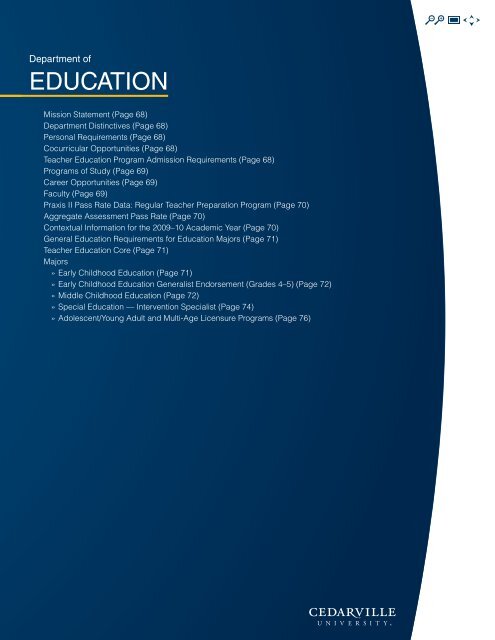
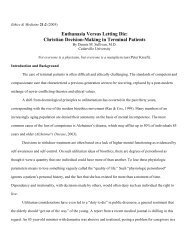
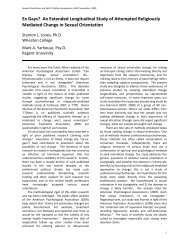

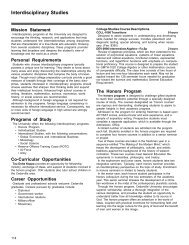
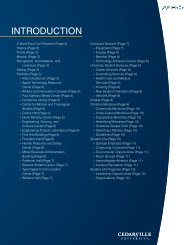
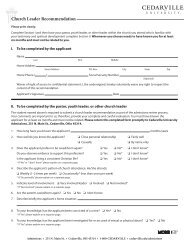
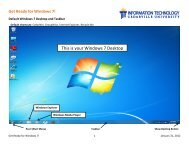
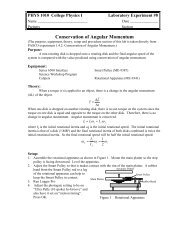
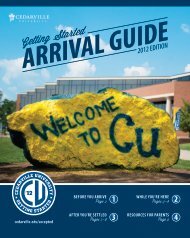
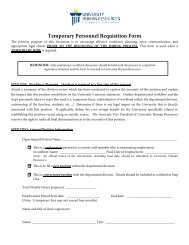
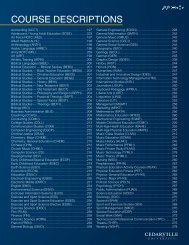
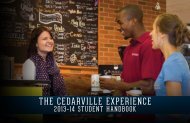

![Girls Volleyball Camp Brochure [PDF] - Cedarville University](https://img.yumpu.com/44713750/1/190x146/girls-volleyball-camp-brochure-pdf-cedarville-university.jpg?quality=85)
